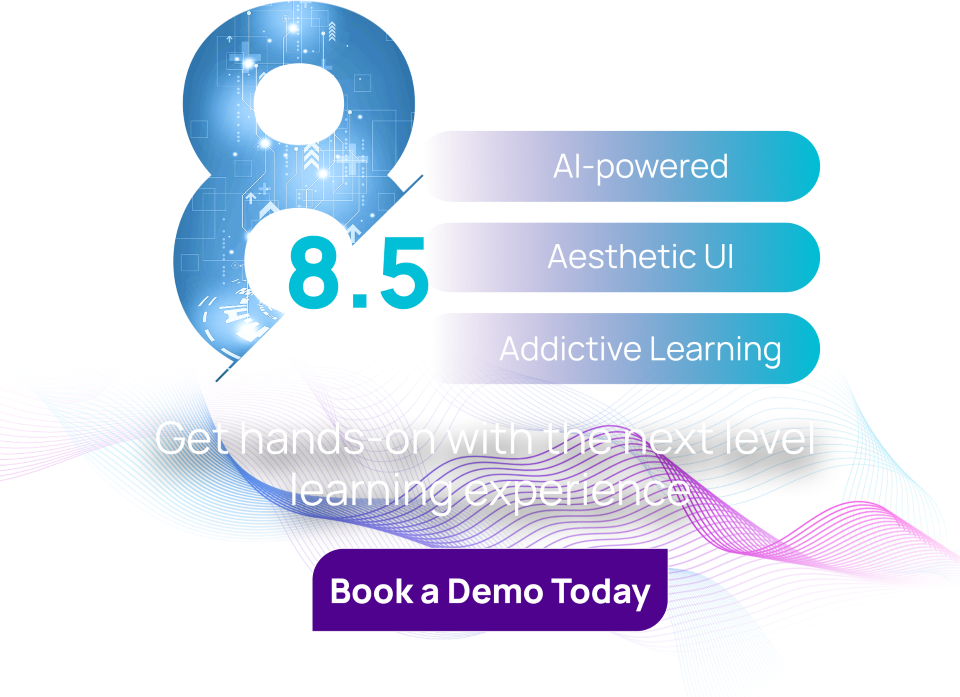
Cloud-Based Learning Management System: Transforming How Enterprises Learn
November 21, 2025
Top Benefits of a Cloud-Based LMS
November 21, 2025Ever wondered what drives an organization’s success today? It’s not just great products, advanced technology, or innovative strategies—it’s the people who keep learning, adapting, and growing every day. The faster your teams acquire knowledge, the quicker your business moves forward. That’s where an enterprise learning management system (LMS) makes all the difference.
Think of it as your organization’s single learning engine that helps your employees build skills, share knowledge, and perform better, no matter where they are. A strategic LMS doesn’t just deliver training; it connects learning to real business goals, turning every learning experience into measurable growth.
For leading organizations, investing in an enterprise LMS isn’t just about adopting new technology; it’s about creating a culture of continuous learning and preparing your people to thrive in a constantly evolving world.
What Is an Enterprise Learning Management System?
An enterprise learning management system is a centralized platform that enables organizations to design, deliver, and track learning across the entire workforce. It powers everything from employee onboarding and compliance programs to leadership development and performance improvement initiatives.
Unlike basic training software, an enterprise LMS integrates seamlessly with HR systems, CRMs, and performance management tools. This integration creates a connected learning ecosystem where learning outcomes directly support organizational objectives.
In essence, an enterprise LMS provides the foundation for enterprise-wide training, making learning scalable, measurable, and strategically aligned with business goals.
Why Organizations Choose a Strategic LMS
Learning has become the heartbeat of modern business. As organizations face continuous disruption, emerging technologies, and shifting skill demands, they need agile systems that support rapid upskilling and reskilling. That’s why many are turning to a strategic LMS to build learning agility and long-term resilience.
- Aligns Learning with Business Goals
A strategic LMS aligns learning with measurable business objectives. It enables organizations to design role-based learning paths that target performance outcomes such as improving sales efficiency, reducing operational errors, or increasing customer satisfaction.
By embedding learning into daily workflows, organizations ensure that training drives tangible results. Learning no longer happens in isolation; it becomes a direct contributor to growth and performance.
2. Powers Continuous Upskilling and Reskilling
Technology evolves faster than job descriptions. Skills that were valuable last year may be outdated today. A corporate eLearning platform solves this by supporting continuous upskilling and reskilling.
AI-driven recommendations, microlearning modules, and mobile-friendly access allow employees to learn at their own pace, wherever they work. This flexibility empowers teams to stay current, close skill gaps, and adapt quickly to industry changes, ensuring your organization remains future-ready.
3. Boosts Employee Engagement and Retention
People stay where they grow. When organizations invest in employee development, they create long-lasting engagement. A strategic LMS builds this engagement by offering interactive, personalized learning experiences.
Gamified modules, real-world simulations, and social learning communities make learning exciting and relevant. Instead of checking boxes, employees enjoy a sense of progress and accomplishment. This not only boosts morale but also strengthens loyalty and retention.
4. Simplifies Compliance and Standardization
For global and regulated organizations, compliance training can be complex and time-consuming. An enterprise learning management system streamlines the process by automating course assignments, reminders, and certifications.
An enterprise LMS also ensures every employee completes the required training and that all records remain audit-ready. This automation reduces risk, saves administrative time, and maintains consistency across geographies and departments.
5. Delivers Actionable Learning Insights
Modern corporate eLearning platforms generate valuable data about how people learn. A strategic LMS transforms that data into insights through detailed analytics and dashboards.
Leaders can track progress, measure engagement, and identify skills that need attention. These insights help organizations make informed decisions about training investments and improve program effectiveness. With clear visibility into learning impact, leaders can connect development directly to performance outcomes.
6. Increases Efficiency and Lowers Costs
Traditional learning models like classroom training and manual onboarding require significant time and resources. An enterprise LMS eliminates those inefficiencies. It automates administrative tasks, digitizes content delivery, and enables organizations to train thousands of learners simultaneously.
By centralizing learning, companies save time, reduce costs, and deliver consistent, high-quality training experiences across teams. Every learning initiative becomes efficient, measurable, and scalable.
7. Supports Global and Hybrid Workforces
Today’s workforce spans time zones, languages, and locations. A strategic LMS brings them all together. With cloud-based access, multilingual capabilities, and mobile learning options, a strategic LMS ensures that every employee, whether working remotely, in the office, on the cloud, or on the move, enjoys equal access to learning.
This accessibility strengthens connections across global teams and helps organizations maintain a unified learning culture, even in hybrid work environments.
Turning Learning into a Strategic Advantage
When organizations implement an enterprise learning management system, they turn learning into a strategic advantage.
Here’s how an enterprise LMS drives long-term value:
- Creates a culture of continuous learning: Employees become curious, proactive, and motivated to grow.
- Develops leadership pipelines: The system helps identify and prepare future leaders.
- Encourages collaboration: Social and peer learning features foster knowledge sharing across departments.
- Builds future-ready capabilities: Continuous learning helps your organization adapt and stay competitive.
By embedding learning into their DNA, organizations unlock innovation, strengthen performance, and achieve sustainable growth.
Why Investing in a Strategic LMS Matters Now
Digital transformation, AI, and automation are reshaping how organizations operate and how employees learn. A strategic LMS bridges the gap between technology and talent by enabling people to acquire the right skills at the right time.
A strategic LMS empowers your employees to perform with confidence while giving your leaders visibility into how learning supports business outcomes. This collaboration drives both productivity and innovation.
When organizations invest in an enterprise learning management system, they invest in their people. They create a learning ecosystem that accelerates performance, enhances adaptability, and future-proofs the business for whatever comes next.
Conclusion: Learning as Growth Strategy
In a world where change never ceases, learning remains the most reliable strategy for growth. An enterprise learning management system transforms learning from a routine HR function into a strategic business enabler.
By delivering personalized, data-driven, and scalable enterprise-wide training, organizations can build stronger teams, achieve faster results, and stay competitive in the digital era.
Learning becomes the foundation for performance, innovation, and long-term success when you align it with your business strategy. That’s the proven power of a strategic LMS: turning everyday learning into enduring growth.
So, how is your organization approaching learning and development in today’s fast-changing world? Have you implemented an enterprise learning management system, or are you at least exploring one?
We’d love to hear your thoughts and experiences. Share your views in the comments; your insights might help others reimagine what learning can achieve.
Other Articles




